Indonesian Economy Booms, Its Infrastructure Groans
インドネシアの経済の急成長にインフラが悲鳴を上げている
by Anthony Kuhn
January 4, 2012
2012年の初頭は少し明るいニュースから。 経済の活況の沸くインドネシアの信用格付けが投資対象レベルに格上げされた。 年6%以上の成長率は頼もしい。日本の商社もかなり積極的に動いているようだ。都市機能が改善される日もそんなに遠くない。そうすれば更なる成長が見込まれる。

Motorists inch their way in heavy traffic in Palembang, Sumatra, in Indonesia. The nation's rapid growth is overwhelming its weak public infrastructure. インドネシアのパレンバン、スマトラでは車がひしめき合っている。 この国の経済の急成長に公共インフラが追い付いていない。
January 4, 2012
Indonesia has one of the world's fastest growing economies, and it's already the largest in Southeast Asia. This growth and stability recently earned it a major credit upgrade at a time when Western countries are fearful of downgrades.
インドネシアは世界で最も急速な経済発展をしている国の一つであり、既に東南アジアでは最大規模になっています。 この経済成長と安定性は、西側諸国が格下げにおののいているなかで、最近大きな格上げを獲得しました。
Yet this vibrant economy has an Achilles' heel: its crumbling, overwhelmed infrastructure.
とはいうものの、この輝かしい経済にもアキレス腱があります。 それはお粗末で、経済発展についていけないインフラです。
The problem becomes painfully apparent this time every year, when the rainy season fills commuters with dread in the capital, Jakarta, and many other cities.
首都ジャカルタや他の多くの都市では、毎年雨季になると通勤者を恐怖に陥れ、この問題は誰の目にも明らかになります。
Tropical downpours make Jakarta's notorious gridlock even more hellish. Gaggles of motorcyclists in ponchos struggle through flooded streets, weaving among the cars and trucks.
熱帯性の大雨がジャカルタを地獄のような交通渋滞に陥れるのは知られています。 ポンチョを着たオートバイの集団が完遂した道路を車やトラックの間を縫うように運転していきます。
Commuters on Indonesia's overcrowded railways are only slightly better off. At one railway station, a woman named Mina balances a large bundle of fruit on her head as she waits for her train. This merchant, who uses just one name, looks aged far beyond her 37 years.
インドネシアの多くの乗客を乗せた過積載の通勤鉄道は少ししか緩和されていません。 ある駅でミナという女性が列車を待っている間、頭上で果物の大きな包みを支えていたました。 このミナという女性は(これだけが名前)自称37歳よりは相当老けて見えました。
Each day, she spends anywhere from an hour-and-a-half to three hours getting from home to the market. Getting to and from work can cost up to a fifth of her monthly income, and she says it's depressing.
毎日彼女は自宅から市場まで1時間半から3時間かけてやってきます。 往復のコストは月の売り上げの5分の1にもなると言い、とても悲しそうでした。
"I am very sad when it rains. I have to travel far to sell my fruit," Mina says with a subdued, resigned tone. "When it rains, I get soaked getting on and off the train. It's scary and tiring. The rain only makes my load heavier."
「雨季になるといつも湯鬱になるの、だって私は果物を売るのにとても遠くからこなければならないから。」と沈んで、半ばあきらめた調子で話した。 「雨が降ると、列車に乗り降りするたびに、私はびしょ濡れになってしまうの。 そりゃ辛いし、疲れるのよ。 雨で荷物も重くなるしね。」
As Mina is talking, a security guard tries to pry loose a knot of passengers who got stuck in the doorway after trying to all squeeze in at once. Nimble young men in flip-flops scramble up the train's side and sit on the roof. The train pulls away, leaving Mina on the platform to wait for another train.
ミナが話しているとき、警備官が、多くの乗客を押し込んだあと、ドア付近に固まっている一塊の乗客をバラバラにさせようとしていた。 敏捷な若者たちは軽々と列車の脇や屋根に飛びついたり乗ったりしている。 列車が発車したが、ミナは次の列車を待つことにしてプラットフォームに残った。
Elly Sinaga, who is in charge of urban transport systems at the Ministry of Transportation, says bottlenecks are simply costing citizens too much.
運輸省の都市交通システム担当のエリー・シナガは一番の問題は交通機関の料金が高すぎることだと話している。
"According to our survey, the transportation costs here in Jakarta and the surroundings are almost 30 to 40 percent of income," Sinaga says. "Also, our costs for the freight transport [are] very high."
「我々の調査によると、ジャカルタ周辺の交通費(運賃)は収入の30%~40%を占めています。 同様に貨物の輸送コストも非常に高額です。」とも言う。
Swallowed By Traffic 交通に飲み込まれて
On Dec. 15, the Fitch ratings agency raised Indonesia's credit rating to investment grade. The agency praised Indonesia's political stability, low public debt and strong consumer demand from a burgeoning middle class, but Fitch warned of inadequate infrastructure.
12月15日に、イギリスの格付け会社フィッチレーティングリミティッドはインドネシアの信用格付けを投資格付けに格上げしました。 同機関はインドネシアの政治的安定と、低い公共負債と急成長する中産階級の消費需要の伸びをその理由として称賛していますが、インフラについては十分ではないと警告しています。
Indonesia's economy is growing at about 6.5 percent a year, and the country spends about 3 percent of its GDP on infrastructure. If it were to increase that amount, its growth might compare more favorably to that of China, whose economy grows at 8 percent, with infrastructure spending of 9 percent.
インドネシアの経済は年率6.5%の成長を見せていますが、この国は国民総生産(GDP)の3%をインフラに投資しています。もし、インフラ投資を増かするとすれば、その成長は、8%の経済成長をし、9%をインフラに投資している中国の成長を凌駕するものとなるでしょう。
Hans Ulrich Furke is an urban planner from Germany who advises the Indonesian government. He says that traffic has swallowed up almost all of the city's open spaces, leaving residents nowhere to congregate but in shopping malls.
ドイツ人の都市計画担当のハンス・ウルリッヒ・フルケ氏はインドネシア政府の顧問をしていが、彼は、この交通事情が都市の開豁地の殆どを占拠しており、そのために人々は商店街にたむろするしか居場所がなくなっていると話している。

Fruit vendor Mina, who uses just one name, waits for a train home with her merchandise wrapped in a pink cloth. 果物売りのミナ(これが名前の全て)は帰路の列車を待っている。 ピンクの風呂敷に果物が詰まっている。
"Public space is just totally occupied by the rich, who have cars and motorbikes," Furke says. "So we don't have the chance to interact in a city, which I would define as healthy, where we meet in open space, in public space."
「公共スペースは一部の富裕層で全て占められており、彼らは自家用車やバイクを所有している。 だから、都市では、我々が健全だとする、公共のオープンスペースでの相互ビジネスなどの機会が持てないのです。」とフルケは説明している。
Furke also blames the mess on Indonesia's energy policies.
同様にフルケはインドネシアの酷いエネルギー政策にも問題があると言っている。
Fuel is subsidized, and that makes driving private vehicles so cheap that they compete with public transport," he says. "Riding a motorbike in Jakarta is cheaper than public transport."
「燃料には補助金がでるので、私有車の運転コストが非常に安く、公共機関より競争力があるので、ジャカルタでは公共機関よりもオートバイの方が安くつくのです。」と彼は言う。
Vice Minister of Transportation Bambang Susantono says Jakarta is serious about improving the quality of its life and becoming a more livable city. He says pilot projects to clear the downtown area of traffic will be expanded.
運輸副大臣のバンバン・スサントノ氏によるとジャカルタは生活の質を改善して、住みやすい都市にすることに真剣に取り組んでいるという。 彼は新たなプロジェクトが都心部の交通網を拡充すると話している。
"I think we will start not for the whole city center, but some part of the city center," Susantono says, "so that people can think that this is really the way for the future — the way we have the car-free day, for example. Now it's getting more and more popular."
「私は、都市の全体ではなく、ある一部から始めようと思っているのです。 人々が本当に未来のある方法だと感じることを・・・・・つまり、例えば車を禁止にする日(ノーカーデイ)を設定するなどの施策です。 今、それは少しずつ認知されつつあります。」
Right now, Sunday mornings in central Jakarta are one of the few times it is blissfully free of cars. The fumes dissipate. The decibel level drops. It's the sound of what could be: Public buses trundle along. Families bicycle together, children rollerblade, and a curbside barista sells cups of instant coffee from his bicycle.
現在、日曜日の朝のジャカルタの中心地は、数少ない嬉しいノーカーデイの一日です。 排気ガスも無く、騒音も無い。 それは、あるべき健全な姿です。 公共バスがスムーズに走り、家族は自転車にのり、子供のローラーボードと一緒に走り、街角のコーヒー売りが自転車でインスタントコーヒーを売っています。
インドネシアの経済の急成長にインフラが悲鳴を上げている
by Anthony Kuhn
January 4, 2012
2012年の初頭は少し明るいニュースから。 経済の活況の沸くインドネシアの信用格付けが投資対象レベルに格上げされた。 年6%以上の成長率は頼もしい。日本の商社もかなり積極的に動いているようだ。都市機能が改善される日もそんなに遠くない。そうすれば更なる成長が見込まれる。

Motorists inch their way in heavy traffic in Palembang, Sumatra, in Indonesia. The nation's rapid growth is overwhelming its weak public infrastructure. インドネシアのパレンバン、スマトラでは車がひしめき合っている。 この国の経済の急成長に公共インフラが追い付いていない。
January 4, 2012
Indonesia has one of the world's fastest growing economies, and it's already the largest in Southeast Asia. This growth and stability recently earned it a major credit upgrade at a time when Western countries are fearful of downgrades.
インドネシアは世界で最も急速な経済発展をしている国の一つであり、既に東南アジアでは最大規模になっています。 この経済成長と安定性は、西側諸国が格下げにおののいているなかで、最近大きな格上げを獲得しました。
Yet this vibrant economy has an Achilles' heel: its crumbling, overwhelmed infrastructure.
とはいうものの、この輝かしい経済にもアキレス腱があります。 それはお粗末で、経済発展についていけないインフラです。
The problem becomes painfully apparent this time every year, when the rainy season fills commuters with dread in the capital, Jakarta, and many other cities.
首都ジャカルタや他の多くの都市では、毎年雨季になると通勤者を恐怖に陥れ、この問題は誰の目にも明らかになります。
Tropical downpours make Jakarta's notorious gridlock even more hellish. Gaggles of motorcyclists in ponchos struggle through flooded streets, weaving among the cars and trucks.
熱帯性の大雨がジャカルタを地獄のような交通渋滞に陥れるのは知られています。 ポンチョを着たオートバイの集団が完遂した道路を車やトラックの間を縫うように運転していきます。
Commuters on Indonesia's overcrowded railways are only slightly better off. At one railway station, a woman named Mina balances a large bundle of fruit on her head as she waits for her train. This merchant, who uses just one name, looks aged far beyond her 37 years.
インドネシアの多くの乗客を乗せた過積載の通勤鉄道は少ししか緩和されていません。 ある駅でミナという女性が列車を待っている間、頭上で果物の大きな包みを支えていたました。 このミナという女性は(これだけが名前)自称37歳よりは相当老けて見えました。
Each day, she spends anywhere from an hour-and-a-half to three hours getting from home to the market. Getting to and from work can cost up to a fifth of her monthly income, and she says it's depressing.
毎日彼女は自宅から市場まで1時間半から3時間かけてやってきます。 往復のコストは月の売り上げの5分の1にもなると言い、とても悲しそうでした。
"I am very sad when it rains. I have to travel far to sell my fruit," Mina says with a subdued, resigned tone. "When it rains, I get soaked getting on and off the train. It's scary and tiring. The rain only makes my load heavier."
「雨季になるといつも湯鬱になるの、だって私は果物を売るのにとても遠くからこなければならないから。」と沈んで、半ばあきらめた調子で話した。 「雨が降ると、列車に乗り降りするたびに、私はびしょ濡れになってしまうの。 そりゃ辛いし、疲れるのよ。 雨で荷物も重くなるしね。」
As Mina is talking, a security guard tries to pry loose a knot of passengers who got stuck in the doorway after trying to all squeeze in at once. Nimble young men in flip-flops scramble up the train's side and sit on the roof. The train pulls away, leaving Mina on the platform to wait for another train.
ミナが話しているとき、警備官が、多くの乗客を押し込んだあと、ドア付近に固まっている一塊の乗客をバラバラにさせようとしていた。 敏捷な若者たちは軽々と列車の脇や屋根に飛びついたり乗ったりしている。 列車が発車したが、ミナは次の列車を待つことにしてプラットフォームに残った。
Elly Sinaga, who is in charge of urban transport systems at the Ministry of Transportation, says bottlenecks are simply costing citizens too much.
運輸省の都市交通システム担当のエリー・シナガは一番の問題は交通機関の料金が高すぎることだと話している。
"According to our survey, the transportation costs here in Jakarta and the surroundings are almost 30 to 40 percent of income," Sinaga says. "Also, our costs for the freight transport [are] very high."
「我々の調査によると、ジャカルタ周辺の交通費(運賃)は収入の30%~40%を占めています。 同様に貨物の輸送コストも非常に高額です。」とも言う。
Swallowed By Traffic 交通に飲み込まれて
On Dec. 15, the Fitch ratings agency raised Indonesia's credit rating to investment grade. The agency praised Indonesia's political stability, low public debt and strong consumer demand from a burgeoning middle class, but Fitch warned of inadequate infrastructure.
12月15日に、イギリスの格付け会社フィッチレーティングリミティッドはインドネシアの信用格付けを投資格付けに格上げしました。 同機関はインドネシアの政治的安定と、低い公共負債と急成長する中産階級の消費需要の伸びをその理由として称賛していますが、インフラについては十分ではないと警告しています。
Indonesia's economy is growing at about 6.5 percent a year, and the country spends about 3 percent of its GDP on infrastructure. If it were to increase that amount, its growth might compare more favorably to that of China, whose economy grows at 8 percent, with infrastructure spending of 9 percent.
インドネシアの経済は年率6.5%の成長を見せていますが、この国は国民総生産(GDP)の3%をインフラに投資しています。もし、インフラ投資を増かするとすれば、その成長は、8%の経済成長をし、9%をインフラに投資している中国の成長を凌駕するものとなるでしょう。
Hans Ulrich Furke is an urban planner from Germany who advises the Indonesian government. He says that traffic has swallowed up almost all of the city's open spaces, leaving residents nowhere to congregate but in shopping malls.
ドイツ人の都市計画担当のハンス・ウルリッヒ・フルケ氏はインドネシア政府の顧問をしていが、彼は、この交通事情が都市の開豁地の殆どを占拠しており、そのために人々は商店街にたむろするしか居場所がなくなっていると話している。

Fruit vendor Mina, who uses just one name, waits for a train home with her merchandise wrapped in a pink cloth. 果物売りのミナ(これが名前の全て)は帰路の列車を待っている。 ピンクの風呂敷に果物が詰まっている。
"Public space is just totally occupied by the rich, who have cars and motorbikes," Furke says. "So we don't have the chance to interact in a city, which I would define as healthy, where we meet in open space, in public space."
「公共スペースは一部の富裕層で全て占められており、彼らは自家用車やバイクを所有している。 だから、都市では、我々が健全だとする、公共のオープンスペースでの相互ビジネスなどの機会が持てないのです。」とフルケは説明している。
Furke also blames the mess on Indonesia's energy policies.
同様にフルケはインドネシアの酷いエネルギー政策にも問題があると言っている。
Fuel is subsidized, and that makes driving private vehicles so cheap that they compete with public transport," he says. "Riding a motorbike in Jakarta is cheaper than public transport."
「燃料には補助金がでるので、私有車の運転コストが非常に安く、公共機関より競争力があるので、ジャカルタでは公共機関よりもオートバイの方が安くつくのです。」と彼は言う。
Vice Minister of Transportation Bambang Susantono says Jakarta is serious about improving the quality of its life and becoming a more livable city. He says pilot projects to clear the downtown area of traffic will be expanded.
運輸副大臣のバンバン・スサントノ氏によるとジャカルタは生活の質を改善して、住みやすい都市にすることに真剣に取り組んでいるという。 彼は新たなプロジェクトが都心部の交通網を拡充すると話している。
"I think we will start not for the whole city center, but some part of the city center," Susantono says, "so that people can think that this is really the way for the future — the way we have the car-free day, for example. Now it's getting more and more popular."
「私は、都市の全体ではなく、ある一部から始めようと思っているのです。 人々が本当に未来のある方法だと感じることを・・・・・つまり、例えば車を禁止にする日(ノーカーデイ)を設定するなどの施策です。 今、それは少しずつ認知されつつあります。」
Right now, Sunday mornings in central Jakarta are one of the few times it is blissfully free of cars. The fumes dissipate. The decibel level drops. It's the sound of what could be: Public buses trundle along. Families bicycle together, children rollerblade, and a curbside barista sells cups of instant coffee from his bicycle.
現在、日曜日の朝のジャカルタの中心地は、数少ない嬉しいノーカーデイの一日です。 排気ガスも無く、騒音も無い。 それは、あるべき健全な姿です。 公共バスがスムーズに走り、家族は自転車にのり、子供のローラーボードと一緒に走り、街角のコーヒー売りが自転車でインスタントコーヒーを売っています。










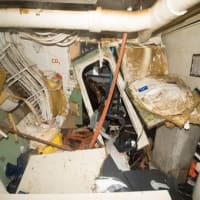



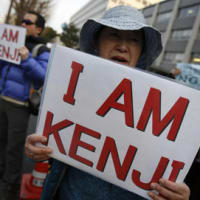
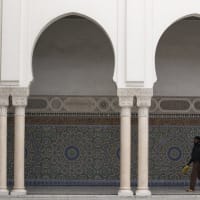
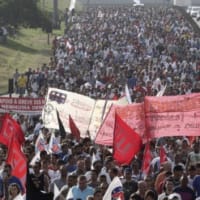
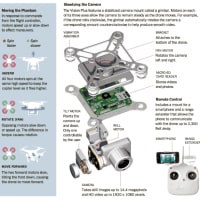
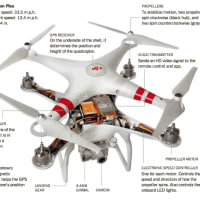

※コメント投稿者のブログIDはブログ作成者のみに通知されます